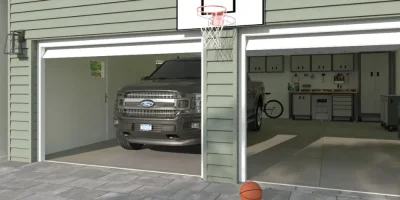Before you quote the cost of a kitchen, you need to know exactly where the money goes
How much does a kitchen remodel cost?
To make faster estimates and stay profitable as a contractor, you need to understand your basic costs.
In this guide, you’ll get exactly what you need to know.
We’ll cover what drives kitchen renovation costs today, from material selections and labor costs to project scope.
You’ll also see how to set a realistic budget and explain it clearly to clients so your next kitchen project stays profitable and on track.
Key Takeaways
- Kitchen remodel costs in 2026 fall into three tiers (minor, mid-range, upscale) based on square footage, finish level, and layout changes.
- Use cost per square foot plus the 5–15% of home value rule to keep your kitchen remodel budget aligned with the house and client goals.
- Minor kitchen remodels that refresh cabinets, countertops, and lighting often deliver the best ROI, while full gut remodels with luxury materials usually return a lower percentage.
- Use software like Cedreo to design 2D/3D kitchen layouts fast, control project costs, and avoid unexpected expenses with clear visuals and material selections.
Why trust us? Here at Cedreo, we’ve got 20+ years of experience working with housing pros in the 3D home design space. We know what it takes for home builders, contractors, and interior designers to create kitchen remodel plans that land them more jobs!
See How You Can Create Complete Projects with Cedreo
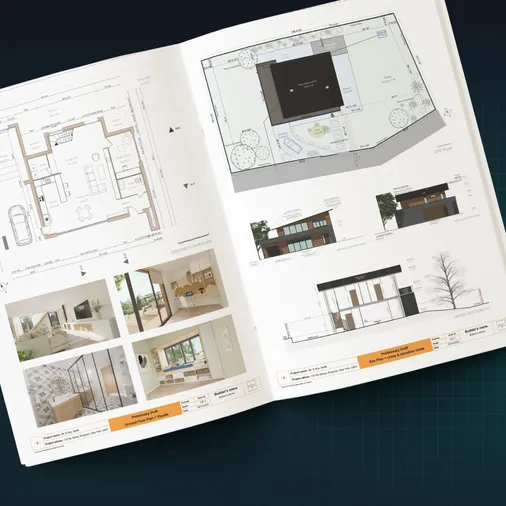
Plans – Get site plans, 2D floor plans, electrical plans, cross sections and elevation views — with all the technical details you need for a comprehensive project overview.
3D Visualizations – Use interior and exterior 3D renderings as well as 3D floor plans to help clients understand the finished project.
Documentation – Manage all your visual documents in one place, so it’s easier to present and sell your projects.
No credit card required, no commitment
Kitchen Remodeling Cost – The Big Picture
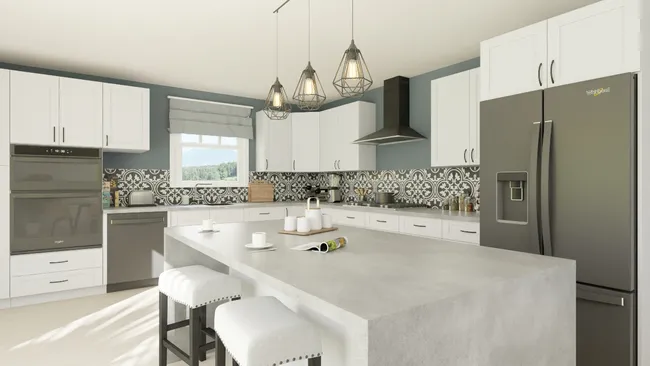
Use this snapshot of average kitchen renovation costs to give clients a clear starting point before you talk finishes, layout changes, or appliance packages.
| Kitchen renovation type | Typical kitchen remodel cost (2026) | What this usually includes | Best use cases |
| Minor kitchen remodel (budget) | $10,000 – $25,000 total cost | Cosmetic refresh that keeps the kitchen’s existing layout, reuses most cabinets, and focuses on paint, cabinet hardware, a simple tile backsplash, lighting fixtures, and selective new appliances. | Flips, rentals, pre‑sale spruce-ups, or homeowners who want a cleaner, more modern kitchen without a full remodel. |
| Mid‑range kitchen renovation | $20,000 – $60,000 average cost | Full replace‑in‑place remodel with new kitchen cabinets (stock or semi‑custom), durable countertop materials, updated kitchen sink and faucet, new flooring, standard appliance package, and improved lighting. | “Forever for now” kitchens where most homeowners plan to stay at least a few years and want the best balance of value, performance, and style. |
| Major / upscale kitchen remodel | $75,000+ remodel cost | Gut remodel with custom cabinetry or bespoke cabinetry, high‑end appliances, luxury materials, smart‑home features, and possible new plumbing or layout changes like adding a kitchen island or removing walls. | High‑value homes, showcase kitchens, or clients who want a fully custom design and are less concerned about the final cost or resale ROI. |
Cost Per Square Foot:
- Across these project types, the cost of a kitchen typically works out to roughly $75 to $250 per square foot.
- For example, a simple 100 square foot galley kitchen might come in near $10,000 on the low end with mostly cosmetic work, but the same square footage with custom cabinets, stone countertops, and new flooring can easily climb toward the top of the range.
The 5-15% Rule:
- Most potential contractors also sanity‑check every kitchen remodel budget against the 5–15% of home value rule so they do not overbuild for the house or underdeliver for the neighborhood.
- For example…
- If a home is worth $300,000, the 5-15% rule suggests a realistic budget of about $15,000 to $45,000 to remodel the kitchen.
- A $700,000 home can often support a higher‑end $35,000 to $105,000 kitchen project without pricing itself out of the market.
Remind clients that these numbers describe average kitchen remodel cost ranges.
Their final cost will vary depending on square footage, materials, level of customization, and how many structural or major renovations are on the wish list.
Average Kitchen Remodel Cost – Detailed Breakdown
Here’s a breakdown of the three kitchen remodel tiers to give you and your clients a better idea of expectations before you start talking details.
Budget/Minor Kitchen Renovation Costs
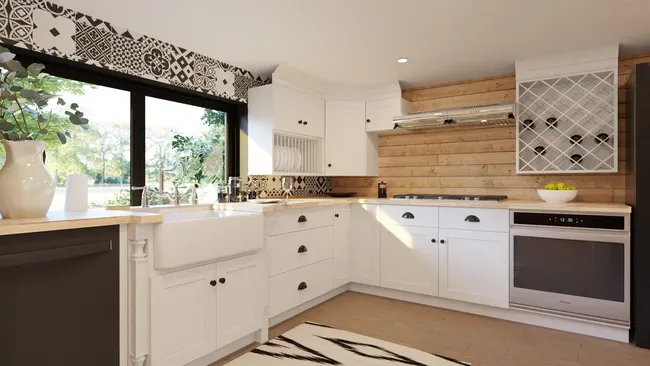
A budget or minor kitchen remodel is a cosmetic refresh that keeps the kitchen’s existing layout and focuses on visible upgrades that save money.
What’s Included
- Keep existing cabinets and update paint, doors, and cabinet hardware.
- Budget countertops like laminate or butcher block.
- Simple tile backsplash.
- Swap only outdated or failing appliances for cost‑effective new models.
- Budget‑friendly flooring such as luxury vinyl plank or sheet vinyl.
- Replace dated lighting fixtures with simple flush mounts or pendants.
Typical Timeline
- Planning, material selections, and ordering usually take one to two weeks when you keep the layout and plumbing in place.
- On‑site work can often be completed in about two to four weeks for a typical 10×10 or small u-shaped kitchen.
- Because there is no gut remodel or major renovations, you usually avoid permits and inspections, which keeps the schedule tight.
ROI:
- A minor kitchen remodel often delivers the strongest ROI because you refresh finishes without major renovations or new plumbing.
- Fresh paint, updated hardware, and new countertops help buyers overlook an older layout and can lead to faster, stronger offers.
- For rental properties, a minor remodel supports higher rent and lower vacancy without adding a large monthly payment for financed upgrades.
Best for:
- Investors and flippers who need predictable kitchen remodel cost and quick turnaround on small to mid‑size kitchens.
- Landlords who want durable, easy‑to‑clean kitchens instead of fully custom designs.
- Homeowners preparing to sell who need listing‑ready photos without paying for a full remodel.
- Budget‑conscious clients who want a fresh new kitchen look more than a new layout, cabinet space, or kitchen island.
Mid-Range Kitchen Average Cost
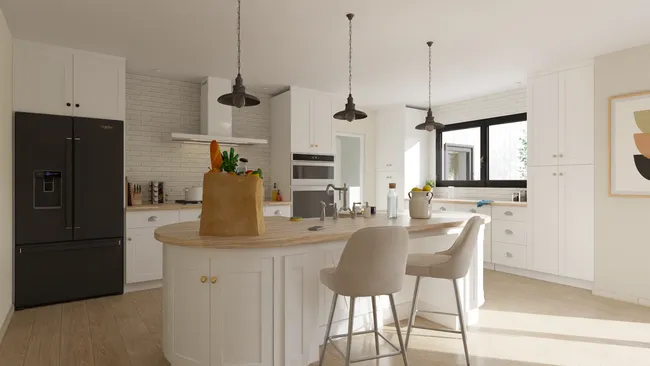
A mid‑range kitchen remodel is a full remodel within the existing footprint that replaces most finishes and fixtures with better materials.
What’s Included
- Replace old cabinets with higher‑quality stock or semi‑custom cabinets.
- Upgrade to solid‑surface or stone countertops like standard quartz or granite.
- Install a complete mid‑range stainless steel appliance package.
- Add new flooring such as porcelain tile or mid‑grade engineered wood.
- Update lighting with circuits for recessed lights, pendants over a kitchen island or peninsula, and under‑cabinet task lighting.
- Replace the kitchen sink, faucet, and install new short plumbing runs needed within existing walls.
Typical Timeline
- Design, layout, and product selections usually take about four to six weeks.
- On‑site work for a standard mid‑range kitchen typically runs six to twelve weeks, depending on size and complexity.
- The first two to three weeks on site cover demo, rough plumbing and electrical, and inspections.
- The remaining weeks are for cabinet install, countertops, flooring, backsplash, appliances, and punch list.
- Keep in mind that these timeframes take into account time waiting for materials, delays, inspections, etc.
ROI:
- Mid‑range kitchen renovation costs generally return about 55% to 70% of their cost at resale, depending on the market.
- New cabinets, countertops, and appliances make the home easier to sell, even if you don’t recover every dollar.
- Clients also gain daily value from better storage, brighter lighting, and a more efficient layout.
Best for:
- Homeowners who plan to stay at least five to ten years and want a comfortable, updated kitchen.
- Design build firm projects that must balance material and labor costs with a realistic budget for the house and neighborhood.
- Kitchens that function reasonably well but need a full refresh of finishes and appliances rather than moved walls or added rooms.
High-End Full Kitchen Remodel Costs
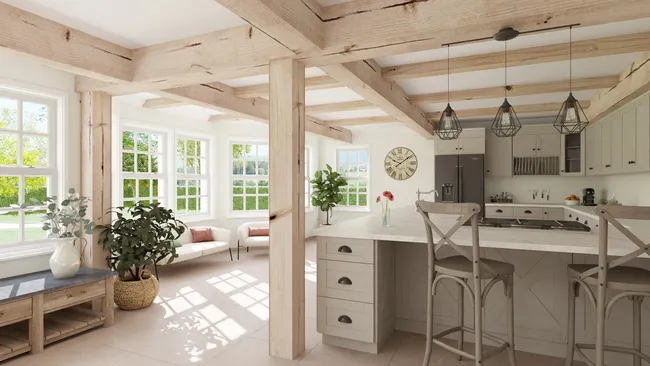
A high‑end kitchen remodel is a full kitchen remodel or gut remodel that combines custom design, layout changes, and premium materials to create a one‑of‑a‑kind space.
What’s Included
- Custom or bespoke cabinetry, often with taller uppers and built‑in organizers.
- Luxury countertops such as quartzite, marble, or high‑end quartz, sometimes with full‑height slab backsplash.
- Professional‑grade ranges, built‑in refrigeration, wine storage, and smart appliances.
- Major layout changes like removing walls, converting galley kitchens to open L-shaped or U-shaped layouts, or adding a large island with a prep sink.
- Wide‑plank hardwood or large‑format stone flooring that often continues into adjacent living areas.
- Design details like custom range hoods, select open shelving, and designer lighting to create a showpiece kitchen.
Typical Timeline
- Design and planning usually take about two to three months or more for custom layouts, engineering, and selections.
- On‑site work typically runs three to six months to complete structural changes, inspections, and detailed finishes.
- Rough work includes new plumbing, upgraded electrical panels, and HVAC changes to support larger appliances and new layouts.
- Finish work covers cabinet installation, stone fabrication, specialty tile, and detailed trim, which are much more labor intensive than a standard remodel.
ROI:
- High‑end kitchen renovation costs usually have the lowest percentage ROI, often around 50% to 60% of the total cost at resale.
- These projects make the most financial sense in luxury neighborhoods where buyers expect fully custom kitchens with premium finishes.
- Many homeowners justify the remodel cost based on lifestyle benefits, especially if they cook and entertain often and treat the kitchen as the main gathering space.
Best for:
- Clients creating a “forever” kitchen in a high‑value house where they plan to stay for many years.
- Major renovations or additions where walls are already open or square footage is being added and a full kitchen remodel is in scope.
- Homeowners who want custom designs, bespoke cabinetry, and top‑tier appliances and understand that cost will vary with every selection.
- Projects where an interior designer, architect, and contractor work together to deliver a true showcase kitchen.
Kitchen Remodel Budget Breakdown
A clear budget breakdown helps you show clients how each part of the kitchen remodel cost adds up and where you can adjust without hurting the final result.
Main Parts of a Kitchen Project Budget
| Budget component | Typical share of total cost | What is included | How it can change remodel cost |
| Cabinets and hardware | About 25%–40% of the total cost | Kitchen cabinets, lower cabinets, pantry units, trim, and all cabinet hardware like pulls and knobs. | Custom cabinets or custom cabinetry with lots of storage features push this up, while keeping existing cabinets or using basic stock boxes keeps remodel cost down. |
| Labor costs | About 18%–25% of the budget | All paid work for your crew and subs, including demo, installation, framing, drywall, painting, tile, and finish details. | Complex layouts, small tight galley kitchens, or jobs with many change orders increase labor, while a simple full remodel with standard materials in an open space keeps time under control. |
| Appliances | About 10%–20% of the budget | Major appliances such as range, refrigerator, dishwasher, hood, and sometimes microwave or wall ovens. | A standard appliance package from mainstream brands keeps appliance costs reasonable, while built‑ins and pro‑style appliances raise the final cost fast. |
| Countertops | About 10%–15% of the budget | All countertop materials, fabrication, edging, and installation on perimeter runs and any kitchen island. | Laminate and basic solid‑surface cost less, while thick stone, waterfall edges, and rare countertop materials increase the total cost per square foot. |
| Flooring | About 5%–10% of the budget | Kitchen floor materials and installation, including prep, underlayment, and transitions. | Luxury vinyl and simple tile patterns are budget friendly, while large‑format stone or site‑finished hardwood cost more in both material and labor. |
| Lighting and electrical | About 5%–8% of the budget | New lighting fixtures, recessed cans, under‑cabinet lighting, wiring, outlets, and any panel upgrades. | A simple swap of fixtures in the same locations is cheaper, but adding many new circuits or decorative elements like layered lighting can increase project costs. |
| Plumbing and fixtures | About 4%–10% of the budget | Kitchen sink, faucet, disposal, new plumbing lines, gas lines, and venting within the kitchen. | Keeping the kitchen’s existing layout and fixture locations controls plumbing costs, while new plumbing to an island or moving a sink to a new wall adds additional expenses. |
| Other and contingency | About 5%–10% of the budget | Permits, design fees, paint, backsplash materials, trim, and a contingency fund for unexpected expenses. | Skipping a contingency is risky because hidden issues like old wiring or water damage can appear once you open walls and quickly eat into a tight kitchen remodel budget. |
Most homeowners do not see these percentages on their own, so walking them through this table helps them understand why changing cabinet lines or adding high‑end appliances has a major impact on the final cost.
Other Factors that Drive Up the Cost of a Kitchen
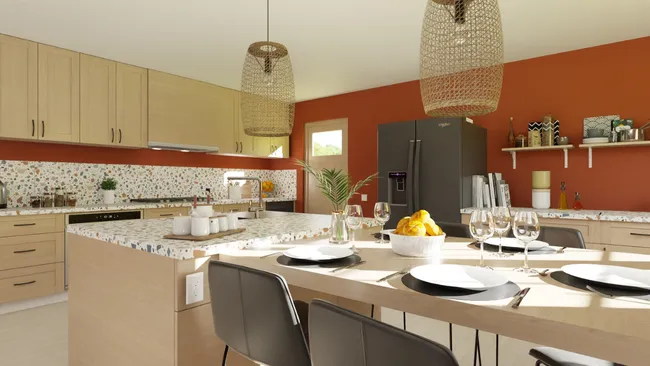
Even with a neat budget table, actual kitchen renovation costs still vary depending on choices you and your clients make at each step.
Labor market and regional pricing
- Labor rates vary by region, so the same square footage can cost much more in a high‑cost city than in a rural area.
- In tight labor markets or busy seasons, bids from contractors and subs tend to climb.
- In slower markets, you can often hold kitchen remodel costs near the low end of typical ranges, even with similar material lists.
Supply chain and lead times
- Supply chain issues for cabinets, appliances, and some countertop materials can raise prices and stretch timelines.
- Delayed products add carrying costs and inefficiencies as crews wait or shift off the job.
- Choosing in‑stock materials and reliable appliance models helps keep the renovation project on schedule.
Client expectations and scope creep
- High homeowner demands, like adding decorative elements or changing selections mid‑project, quickly expand scope.
- Small upgrades such as premium cabinet hardware, extra open shelving, or moving lights often snowball if you do not reset scope.
- Clear drawings and 3D visuals from Cedreo help clients commit early and reduce changes that push kitchen renovation costs higher.
Hidden issues and code requirements
- Old plumbing, outdated wiring, or structural surprises behind walls are common and can add thousands in extra work.
- Permits, inspections, and required code upgrades add costs clients rarely plan for.
- Building a 10% to 15% contingency into every kitchen remodel budget protects both you and your clients from these issues.
How Contractors Can Save Big on Kitchen Remodels
Use these proven tactics to control kitchen remodel cost, protect your margins, and still deliver a new kitchen your clients are excited to show off.
Keep the Existing Layout
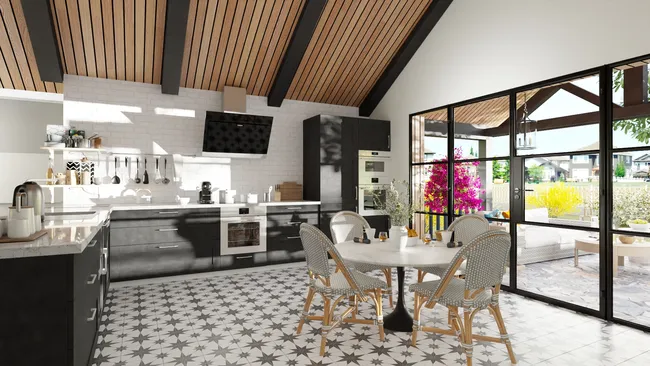
What it means: You design the kitchen renovation around the current plumbing, gas lines, and walls instead of moving everything.
How to save:
- Keep the kitchen sink, range, and dishwasher in the same locations to avoid new plumbing and gas runs.
- Reuse existing cabinets where you can and focus the budget on cabinet doors, paint, and hardware.
- Adjust cabinet sizes and appliance placements within the same footprint.
- Tell clients that moving walls or pipes adds cost and increases the chance of surprises once you open the house.
Buy Materials in Volume
What it means: You plan material selections across jobs so you can buy cabinets, countertops, and finishes in bulk at better pricing.
How to save:
- Standardize a few trusted cabinet, countertop, and flooring lines so you can order in larger quantities at better pricing.
- Repeat the same tile backsplash, cabinet hardware, and lighting fixtures across projects.
- Use pro accounts with key vendors for contractor pricing on appliances, cabinets, and new flooring.
- Keep a small stock of high‑use items like pulls, trim, and under‑cabinet lighting to avoid pricey one‑off purchases.
Schedule Around Busy Seasons
What it means: You time each renovation project to avoid peak demand periods when every contractor and sub charges more and is booked out.
How to save:
- Schedule flexible clients just after major holidays or in late summer when crews are more available.
- Line up trades early so you avoid rush premiums and limited subcontractor choices.
- Use slower weeks for planning, client meetings, and approvals so active jobs move smoothly.
- Plan indoor remodels for winter months when contractor demand (and usually prices) are lower.
Plan the Job in the Right Order
What it means: You sequence every part of the kitchen project so trades, inspections, and deliveries happen in a smooth flow.
How to save:
- Build a simple schedule that runs from demo, to rough plumbing and electrical, to cabinets, countertops, and finishes with few gaps.
- Order long‑lead items like custom cabinets and appliances before demo so you aren’t stuck waiting on key pieces.
- Use phase checklists so trades don’t miss outlets, vents, or blocking inside walls.
Lock-In the Plan Before You Order
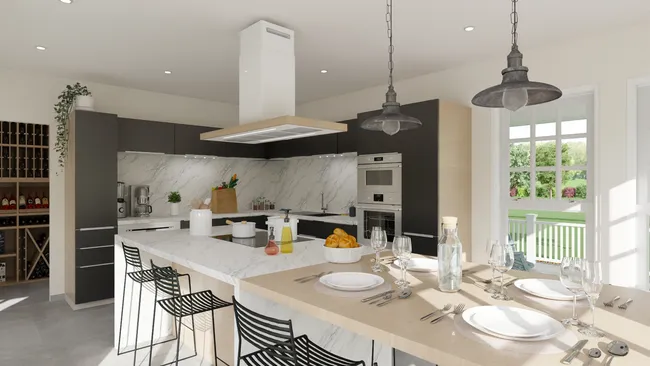
What it means: You finalize design decisions with the client before you place big orders so mid‑project changes don’t blow the budget.
How to save:
- Walk clients through cabinet layouts, appliance choices, and finishes and get written approval before ordering.
- Explain that late changes to cabinets, countertops, or appliances cause delays and change orders.
- Show Cedreo 3D views and renderings so clients can see the kitchen and are less likely to ask for changes later.
Promote High-Margin Upgrades
What it means: You highlight upgrades that add big value for homeowners but are efficient and profitable for your team to install.
How to save:
- Create good‑better‑best packages that bundle under‑cabinet lighting, pull‑out trays, and faucet or sink upgrades.
- Use past projects to show how small decorative elements changed the look of a kitchen.
- Keep layout work simple and let clients invest extra budget in finishes where margins are healthy.
Use Design Software
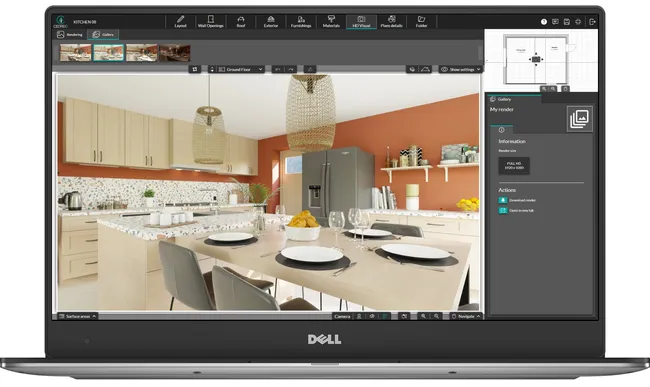
What it means: You design each kitchen in 2D and 3D with a kitchen planner so you catch issues early, price accurately, and avoid rework.
How to save:
- Generate 2D floor plans, 3D floor plans, and realistic renderings to help homeowners make better design decisions.
- Include Cedreo visuals in project presentations so you win more work at better rates and avoid unpaid redesigns.
Design Your Next Kitchen Project With Cedreo
A profitable kitchen remodel starts with a clear plan, realistic budget, and visuals your clients can actually understand.
With Cedreo, you draw a 2D floor plan, explore 3D layouts, and test material & lighting options with photorealistic renderings, before you ever touch the existing kitchen.
That means you catch layout conflicts early and show homeowners exactly how their new kitchen will look and feel.
That makes it easier to get approvals in fewer meetings while keeping your remodel cost and client expectations all on the same page.
Kitchen Renovation Cost FAQs
A full kitchen remodel can be a smart investment when the budget fits the house value and the neighborhood.
Minor and mid‑range projects usually deliver the best percentage ROI, while high‑end kitchens often pay off more in daily comfort and easier resale than in pure dollars.
Yes, you can often do a minor kitchen remodel for around $10,000 if you keep the kitchen’s existing layout, reuse cabinets, and focus on cosmetic upgrades.
That budget typically covers paint, hardware, a basic countertop or backsplash refresh, along with one or two new appliances in a smaller space.
For a standard 10×10 kitchen, most homeowners spend roughly $10,000 to $30,000 depending on whether it is a minor refresh, mid‑range replacement, or full remodel with higher‑end finishes.
Across the U.S., the average kitchen remodel cost for a typical house usually falls between $20,000 and $60,000, with small cosmetic jobs below that and upscale renovations above it.
Cabinets are usually the most expensive part of a kitchen remodel, often taking 25% to 40% of the total cost once you factor in boxes, trim, and cabinet hardware.
Labor is often the second‑largest line item, especially when you add structural changes, new plumbing, or detailed tile and finish work.

